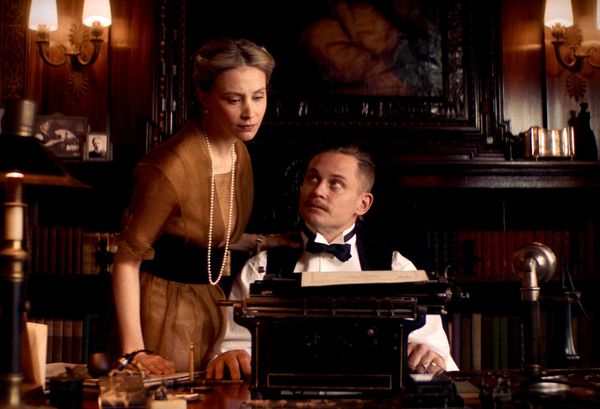 |
| Some Luchino Visconti grandeur in Austin Stark and Joseph Schuman’s Coup! with Jay Horton (Billy Magnussen) and his wife Julie (Sarah Gadon) |
We start out by discussing how the global events of 1918 correlate with the present, the mystery of a missing finger left on the cutting room floor, pacifism and vegetarianism. We move on to nods to F Scott Fitzgerald’s The Great Gatsby, George Bernard Shaw and Upton Sinclair, pigs turning into chickens, the APL, Sarsgaard’s Pied Piper harmonica allure, finding Gilded Age mansions in New Jersey, a Visconti aura, the dialectic between civilisation and savagery, and more.
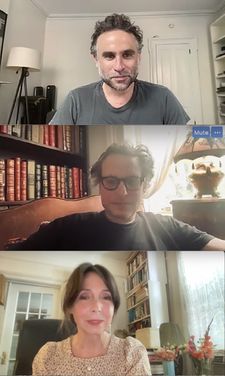 |
| Austin Stark with Joseph Schuman and Anne-Katrin Titze on giving a nod to The Great Gatsby with the names Jay and Egg Island in Coup!: 'We were indeed. Both of those …' |
Soon the dynamics among the staff, led by Ms McMurray (Nielsen), with Kaan (Tahir) and Mrs Tidwell (Marshall), and the family begin to shift as convictions are being tested, lies and politics intermingle, and nothing seems to be the way it was before Mr Monk’s arrival. Phone calls with Upton Sinclair, lures from McClure’s magazine have paranoia settle in, while rules are replaced by new rules. Though steeped in the past (“Willie” Randolph Hearst gets a shoutout and the American Protective League is in full swing) this coup, triggered by pandemic times and stark social divides, is just as much about what lies ahead.
From New York City, Austin Stark and Joseph Schuman joined me on Zoom for an in-depth conversation on Coup!
Anne-Katrin Titze: I think very often that the more specific a story is, the more it becomes universal. You give us a specific time at the start, October 14, 1918. It’s an interesting choice because Influenza, the Spanish Flu, had been raging since the spring and we are about a month away from the end of the First World War. Why did you choose this specific moment in which to set the story?
Joseph Schuman: When we were researching, we were struck by the uncanny parallels to the present. Not just the Spanish Flu and a nation that always seems to be on the verge of war. Also it was the birth of various cultural and political movements, like yellow journalism, progressivism, and so much of it seems to relate to our present in both pleasant and deeply unpleasant ways. We saw a sort of ironic and darkly comedic potential in the idea of how little changes as time goes by. It’s that Sisyphean idea that I think appealed to us very deeply.
AKT: With the war almost already in the past, we are led to think about the Floyd character’s possible past in the war. He has a finger missing!
Austin Stark: He didn’t fight in this war, he fought in a war years ago and he says - I think we might have cut this from the final cut - but he explains that because of the finger injury he wasn’t a part of the war. And then he asks Jay what his reason was for not being a part of the First World War. That might have not made it into the cutting room. But there was this whole tension, this beat that we had built at some point that explains exactly what you are talking about. Where he is essentially accusing Jay of being yellow, like, what’s your injury? And he actually has a wound from a different war.
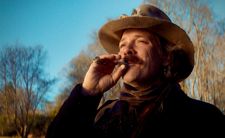 |
| Austin Stark on Peter Sarsgaard as Floyd Monk: 'We had no idea that he played the harmonica' |
AS: It’s funny because a lot of people have seen the movie and that’s the first time anybody has asked that question, which is really interesting.
AKT: When something is missing, the mind can go anywhere and I was putting it together with For Me and My Gal, the song we hear at the start and over the end credits. In the movie by that name [directed by Busby Berkeley in 1942], which was Gene Kelly’s first film role, the character he plays purposefully injures his hand in order not to be drafted into the First World War.
AS: Oh interesting! We didn’t think about that!
JS: The bigger picture is that at that time, pacifism, which Jay and his family are, is totally unheard of. I mean, everyone is basically for whatever war people happened to be fighting. But at that time the propaganda mechanism with Woodrow Wilson to support the war was so all encompassing and for Jay to actually be against it, was an outlier position. In contrast to Floyd, the more blue-collar soldier type that typically goes off to die in these things.
AKT: With the name Jay and the name of the island, Egg Island, were you hinting at Gatsby?
AS: We were indeed. Both of those, the name of the island and Jay were borrowed from The Great Gatsby as a nod.
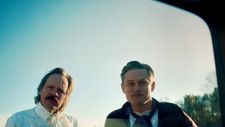 |
| Joseph Schuman on Floyd Monk (Peter Sarsgaard) and Jay Horton (Billy Magnussen): 'One of the things we knew we did not want to do, was have conventional hero and villain roles' |
JS: I think in terms of Jay and his beliefs, it’s really this deeply held, highly convicted pacifism. He is not only against war, which was an outlier position, he is also a vegetarian, which at that time was also a very sort of outlier position. He cannot suffer another life being taken. So his arc is doubly ironic in that sense, in terms of where he ends up at the end of the film.
AS: I think the vegetarianism specifically came about from researching various characters during that time who were vegetarians, which we found interesting. Then it also felt organic because making Jay a pacifist was most important to us, that’s where we started with it. Then it felt like an organic character quality to also make him a vegetarian. It helps blend it together.
AKT: Who were these other vegetarians you discovered?
JS: George Bernard Shaw, incidentally, was the contemporary whom we modeled the vegetarian after. There’s a picture of Bernard Shaw in his office, if you pay very close attention.
AKT: I did not catch that! Upton Sinclair was not vegetarian?
JS: No!
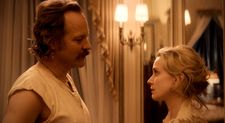 |
| Mr Monk (Peter Sarsgaard) with Mrs Horton (Sarah Gadon) in Coup! |
JS: Sinclair, who is an inspiration on the Jay character, Billy’s character, he was a progressive journalist at that time. He wrote Asphalt Jungle, which wanted to show the working conditions of the poor. But since it was a meat packaging factory he ended up actually creating a bunch of vegetarians, because they were so revolted by his descriptions of what was going on. But that wasn’t his intention.
AKT: That’s exactly why I was asking! The APL, the American Protective League, I had never heard of before. It’s an interesting detail that ends up being part of the paranoia, maybe, that Jay feels.
AS: Yeah, that’s exactly why we chose the APL. I mean, we wanted to be specific to the time period and it wasn’t just to give us some distance from Covid. We found that that’s one of the things that really made the script pop when we decided to set it during the Spanish Flu. But when we did decide to set it during that time, we had to be very detailed and true to that time period. So the APL was a real organisation that was part of the government that Wilson headed. We chose to integrate it because it does heighten that tension and that paranoia.
JS: Additionally, it was sort of a mass censorship regime that Wilson was organizing at the time to get America on board with fighting in the First World War. All of the free speech, yelling fire in a crowded theatre, all of that comes from Wilson’s suppression of dissident voices to war, that found their way into the Supreme Court. It goes to show the level of the censorship, which again has startling parallels to the present.
AKT: When we first see Floyd, but really throughout, the choice of costume makes him seem almost like a Rat Catcher of Hamelin. There is a tale quality to the narrative, I mean, the children are introduced as Peter Pan and Tinker Bell. Later comes the tale of the Knight and the Wizard. So folklore and tale telling is very strong as an undertow in your film as well.
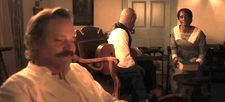 |
| Floyd Monk (Peter Sarsgaard) with Kaan (Faran Tahir) and Ms McMurray (Kristine Nielsen) before the coup |
AKT: Did he come up with the bullet necklace?
JS: Yeah, that was all Peter.
AS: The thimble was our idea. Peter brought the harmonica to set as well. We had no idea that he played the harmonica. He just showed up, started playing it when we were rehearsing a scene and we were like, that’s great, let’s use it.
AKT: There comes the Pied Piper! I loved how you connected that to the score. It makes us wonder what came first.
AS: We built that piece you are talking about around the harmonica, made sure it was in the right key and had it complement that.
AKT: It’s great. To continue a bit with the costumes, one shot that I found particularly striking is when we see the wall with the small blue bricks matching exactly Sarah Gadon’s eyes and the hat band! That repetition of blue makes it a great shot!
JS: Thank you! I’m so pleased you picked up on that. I mean, we didn’t change her eyes to match the set, but we would have if we could have!
AKT: Which brings me to the locations, the mansions. Where did you film?
AS: We shot in New Jersey, believe it or not! We ended up using three Gilded Age mansions to piece together the Horton estate. One for the exterior, one for the interior, and one for the indoor pool. It was a very interesting process of figuring out whether those three mansions could blend together to become something that we always envisioned for the Horton estate.
That took a lot of storyboarding and making sure the windows were right from the interior to the exterior and looking at a number of different properties before we were able to figure out that these three would be the ones that blend together.
JS: And they are all period appropriate mansions, they are all pre-Gilded Age mansions. In New Jersey, there’s a pocket that during the Gilded Age the wealthy would hang out in their enclave.
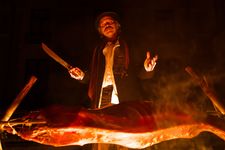 |
| Floyd Monk (Peter Sarsgaard) the butcher |
JS: Serendipity actually plays a much bigger role than anyone would like to believe in these things.
AKT: The location influences how we see. Billy Magnussen at times reminded me of Helmut Berger in Visconti films. The background gives him that grandeur.
JS: Yeah, he does have a Visconti … I can see that, The Leopard, or something.
AKT: I never thought of Magnussen in the context of Visconti, or Helmut Berger before, but here it is. The power dynamics surrounding the lies and the shooting are very interesting. I want to speak a bit in code here to not give anything away. Being complimented for something that is so clearly a lie and having the person who set it all up at the same table - all those dynamics are quite extraordinary. Tell me about how you were constructing this!
AS: You mean photographically?
AKT: Actually both, photographically and in the script, these dynamics around the dinner scene.
AS: Oh, the dinner scene, I know what you are talking about.
JS: Talking about the last scene of the film dinner scene, I think from the outside in writing, one of the things we knew we did not want to do, was have conventional hero and villain roles. So creating these shifting identifications in the audience of who’s in the right and who’s possibly in the wrong became a sort of guiding principle of how we would then relay information and create mystery around Floyd’s motives.
And suspense in terms of Jay’s gradual unraveling of them. So in terms of the last scene, it’s really the final kind of revelation of that dynamic. I’m trying to speak in a way that is not going to have any spoilers. I would say, it’s that, who’s hero, who’s the villain? Putting it on the audience to decide.
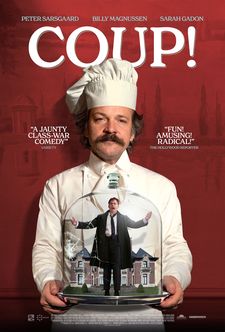 |
| Coup! poster |
JS: And at the same time, the substance of the scene is savagery masquerading as civilization. You know, in that dialectic between civilization and savagery that’s the final, sort of ironized destination point.
AKT: And all that lives under the swimming pool! There’s an entire civilization and underneath that another civilization and a saber-toothed tiger underneath it all!
JS: Exactly!
AKT: One last quote from your film that I noted down: Nature has its way of creeping into the modern world and brings out the beast in some and the beauty in others. How true!
AS: We love that line! It’s because this situation just strips these characters down to who they really are and takes away the power dynamics that were set up by society. And we can see these characters interact without all that bullshit and that’s what we found really interesting in creating this story.
AKT: Thank you so much for this!
JS: Thank you! It was a pleasure!
AS: This was fun! We enjoyed this!
Coup! Opens in the US on Friday, August 2. There will be a Q&A with Austin Stark, Joseph Schuman, Peter Sarsgaard, and Billy Magnussen following the 7pm screening at Regal Union Square in New York on the opening night.
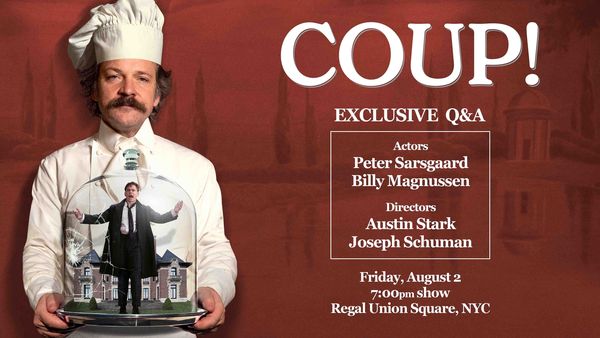 |
| Coup Q&A |





















